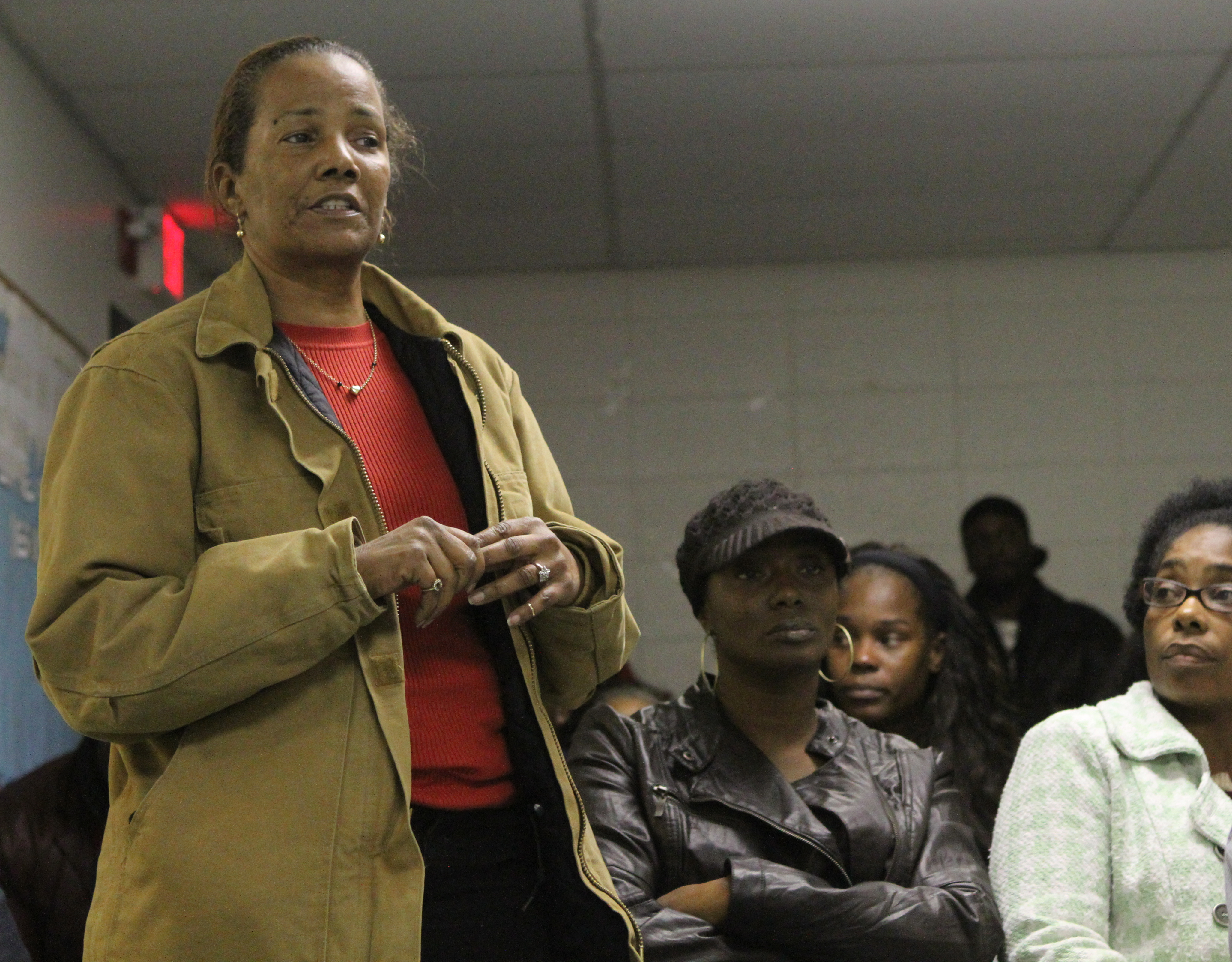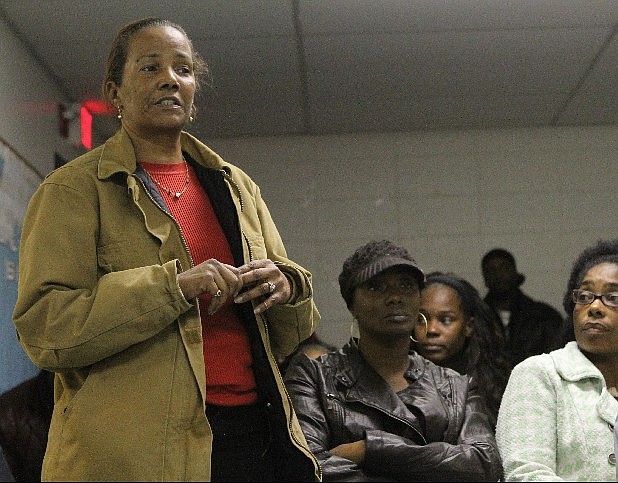 Deatrice Craddock, mother to Joe and Juanzell Jenkins, two men indicted in the recent roundup and arrest of 32 individuals, all of whom are black, speaks to the crowd about her sons' positive qualities, saying they do not deserve to be labeled "worst of the worst." Craddock was at a meeting held by the Chattanooga-Hamilton County NAACP chapter to discuss the effects of the roundup and its media coverage on the black community on Tuesday in Chattanooga.
Deatrice Craddock, mother to Joe and Juanzell Jenkins, two men indicted in the recent roundup and arrest of 32 individuals, all of whom are black, speaks to the crowd about her sons' positive qualities, saying they do not deserve to be labeled "worst of the worst." Craddock was at a meeting held by the Chattanooga-Hamilton County NAACP chapter to discuss the effects of the roundup and its media coverage on the black community on Tuesday in Chattanooga.Good-paying jobs, a solid support network and meaningful education would help keep men from committing crimes, said many attending an NAACP meeting Tuesday night.
The meeting was called to discuss the Nov. 4 arrests of 32 black men who are charged with conspiracy to distribute crack cocaine - men officials say are the "worst of the worst" criminals in Chattanooga.
Many attending the meeting were mothers and sisters of the 32 men. Shantika Bennett came to the NAACP meeting in tears hoping to get help for her brother, Guy Wilkerson, one of the men charged.
She didn't expect the NAACP to get him out of jail, but she wanted him to get better care. Wilkerson, diagnosed with ADHD and bipolar disorder, does not get his medicine, and he's in a jail cell with rapists, Bennett told the crowd.
But when NAACP President James Mapp suggested that the group could make a difference for the men by voting for politicians who share their interest, Bennett got upset and eventually left.
"What does voting have to do with helping these young men?" she asked. "They're going to get out of jail, feel like they still can't get a job and go back to what they were doing. If they help them do something, get a job, maybe they can do something in life."
Bennett was among more than 50 people at the NAACP general meeting held to discuss the roundup.
Black men make up most of the city's shooting victims and homicide victims.
"Black men of all ages are just 6 percent of the population, and they are 50 percent of all homicide victims," said David Kennedy, who created the anti-crime program Chattanooga has committed to implementing as a part of Mayor Andy Berke's public safety policy. The program is expected to go into full swing beginning next year.
The High Point Initiative, named after High Point, N.C., where the strategy was first implemented, reduces violence by first targeting drug dealers who commit violent crimes. A key part of High Point also involves building community support and trust, and offering outreach support to offenders willing to reform.
Nonfatal shootings tend to go unsolved because of a lack of cooperation. A review of shooting records earlier this year showed police only make arrests in about 30 percent of nonfatal shootings.
"Most black-on-black shootings never get prosecuted. A lot of this violence is offender on offender," Kennedy said.
It goes against street code to talk to police, but officials hope federal indictments that carry lengthy sentences have the potential to change that.
One woman said her son was told, "'We want you to tell on the next person.' ... They keep putting him in the hole. They're treating them like animals. ... You need to help them, not judge them."
With the federal charges pending, some offenders could face 20 years up to life in prison. There is no parole.
Kennedy had no first-hand knowledge about the investigation, which began in 2009 and led to the indictments, which were announced in a news conference attended by federal officials, Berke, Chattanooga Police Chief Bobby Dodd and City Councilmen Yusuf Hakeem and Moses Freeman, among others.
However, Kennedy said the roundups, which are expected to continue, lay the groundwork for the High Point program by ridding the community of the most violent offenders.
"Dealing effectively with young black offenders is the most effective thing that can be done to save young black lives," Kennedy said. "It's not that anyone wants to keep making these cases, but in the larger strategy it's very important. ... Nobody in any community wants to see a lot of their own rounded up and sent to prison."
The Times Free Press on Sunday ran mugshots of the 32 offenders on the front page, along with a story examining their criminal backgrounds. A few had no serious prior criminal history while others have faced murder charges. Collectively the group has been linked to more than 300 crimes in Hamilton County, according to arrest records.
Some members of the community felt the photos of the men, all black ranging in age from 19 to 49, struck a painful chord through the community. Many of the men are fathers.
Several sisters, mothers and cousins of the men arrested cried and told stories of how their relatives might have done something wrong, but have also done good and should not have been labeled the "worst of the worst."
NAACP officer Carolyn Tatum took Wilkerson's name and said the NAACP would work on trying to make sure that he got his medicine. She said the organization would work to ensure that the men receive humane treatment.
But she acknowledged a harsh reality:
"We're going to have to realize some of these people are guilty," she said.
William Ladd, NAACP vice president, said the organization's executive committee is scheduled to meet Dec. 3 to discuss their next plans to help the men. He said the NAACP's national office could send people down to investigate racial profiling.
"We feel if they have a roundup for these brothers and they don't have a roundup for meth, which is a drug that mostly whites use, then there is no equity in that," Ladd said.
Mapp started the discussion by reading a statement that said the NAACP recognizes that the roundup involved only black men and that the organization expects others to be charged to dispel the perception that the roundup was racially motivated.
"All crime is not committed by black young people," Mapp said.
Then he asked that there be a different type of roundup.
"A roundup for jobs and job opportunities to prevent the need for another roundup," he said.
Greg Miller, founder of People United Living Love, told the group about his organization to assist people with felony records get jobs. PULL will meet at 6 p.m. Thursday at Olivet Baptist Church.
"They come home from prison to nothing," Miller said. "We need to be able to obtain jobs. Having a strong support system plays a major role."
Contact staff writer Yolanda Putman at 423-757-6431 or yputman@timesfreepress.com. Contact staff writer Beth Burger at 423-757-6406 0r bburger@timesfreepress.com.
